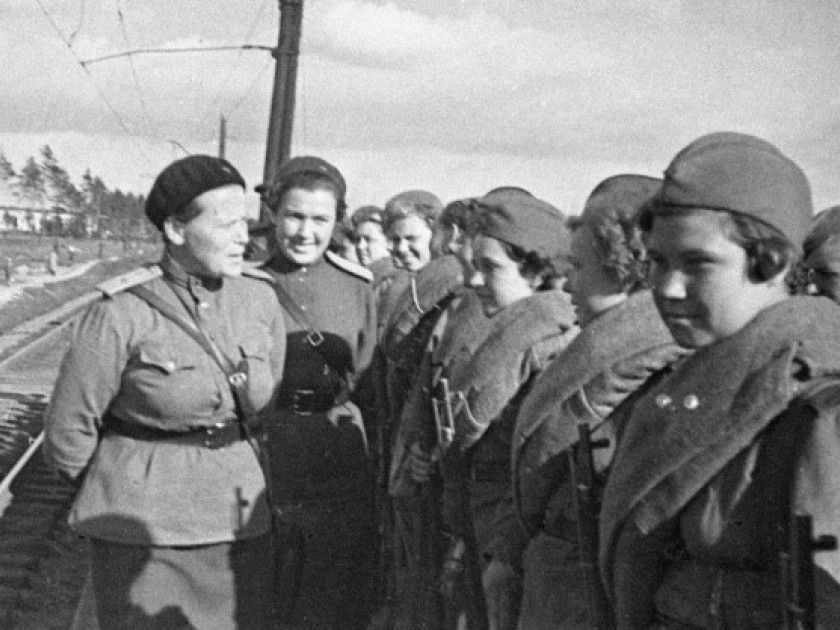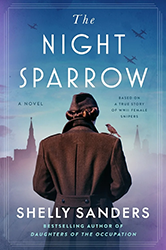
Major Yekaterina Nikiforova speaking to students at the Central Women’s Sniper Training School about to be deployed, 1 April 1943, Photo by V. Krasutskiy
After months of training at the inaugural Central Women’s Sniper Training School, an all-female Red Army platoon arrived on the 2nd Belorussian Front. It was February, 1944, and these women were amongst the first female snipers to ever be in combat. Their male superior officers were unimpressed. The colonel ordered the platoon to remain at division headquarters, but Sergeant Bella Epstein refused, saying, “No, we’re snipers, send us where we’re supposed to go.”
As a Jewish author, I felt a surge of adrenaline at Bella’s fortitude in the face of overt misogyny, and decided the protagonist in my new novel, The Night Sparrow, had to be Jewish, too. I couldn’t resist the irony of Jewish women hunting Nazis, and I wanted to explore the complexity for Jews serving in Joseph Stalin’s Red Army, where they were not recognized as a nation, yet fought against a regime that considered them a race to be exterminated.
I came across Bella Epstein in Svetlana Alexievich’s Nobel Prize winning book, The Unwomanly Face of War: An Oral History of Women in World War II. In an interview with Alexievich, Bella’s recollection of her arrival on the front gave me a visceral sense of her youth and inexperience: “The first time planes flew over, I crouched down and covered my head with my hands, then I thought, And what about my poor hands? I wasn’t ready for death yet.”
This troika of fear, innocence, and determination was a common experience for many of these women in the first female platoon, along with their convoluted path to becoming snipers.
Another one of these remarkable Jewish women was Sara Erenshtein, whose parents died during the family’s escape from Riga, Latvia, to Uzbekistan. Sara was a medical orderly before completing sniper officer courses. Many of the 2,500 female snipers started their military work in medical battalions and partisan groups, as they were expected, as women, to treat injuries on the front. Sara embodied the bravery of both roles, bandaging injured soldiers and pulling “four soldiers at a time from the battlefield,” wrote her commander, Zhanis Griva, in an article entitled “Snegurochka” (Snow Maiden) he wrote for a military magazine.
It was February, 1944, and these women were amongst the first female snipers to ever be in combat.
Once, Sara was tasked with eliminating the Germans who were shooting at her platoon from a broken-down tank. After digging herself into the snow, Sara shot and killed three Germans, then had to stay camouflaged in the snowy terrain until it was dark, to avoid being shot by the enemy.
Sara’s skills as a medic and a sniper, along with her astounding endurance, inspired and informed the characters in my new book, including my protagonist, Elena. Curiously, during her time in the platoon, Sara’s name was changed to a Russian version, Shura, possibly because of antisemitism within her unit. While I didn’t find any antisemitic incidents within the female snipers’ regiments during my research, Jewish women did have to tolerate Stalin’s decree that they were not targeted by the Nazis, even though mass graves were filled entirely with Jews in the Soviet Union.
A non-Jewish sniper, Roza Shanina, was crucial for my understanding of how a teenager coped with seemingly incompatible desires: to experience love and to protect the Motherland. In her diary, she writes, “I was very successful fighting back one of the enemy’s counterattacks. 15 kills for sure, as I was at close range and shot a lot…after dark went to Nikolay and quarrelled with him about Lena — my rival from the medical battalion.”
To comprehend the impact of front-line combat on female snipers, I looked to Bella Epstein’s recollection of an incident that occurred as she rode a streetcar in Minsk after World War II. She recounts, women cried out, “A man’s been killed! A man’s been killed! And I sat alone in the car. I couldn’t understand why everybody was crying. I didn’t feel it was terrible. I had seen so many people killed at the front…I didn’t react.”
It’s been eighty years since these proud females defended their homeland. In a twist of bitter irony, when the war ended, their names and accomplishments were expunged by the country they fought to protect. Today, as we’re experiencing an alarming swell of antisemitism, along with a shocking erosion of women’s rights, these female snipers’ stories are essential for reconstructing the past accurately, understanding Jewish female fighters in this war, and for inspiring future generations.

The Night Sparrow by Shelly Sanders
Shelly Sanders is the bestselling author of the adult novel Daughters of the Occupation and the acclaimed young adult historical novels The Rachel Trilogy. She began her writing career as a freelance journalist working for major publications, including the Toronto Star, National Post, Maclean’s, Canadian Living, Reader’s Digest, and Today’s Parent. She lives in Ontario.